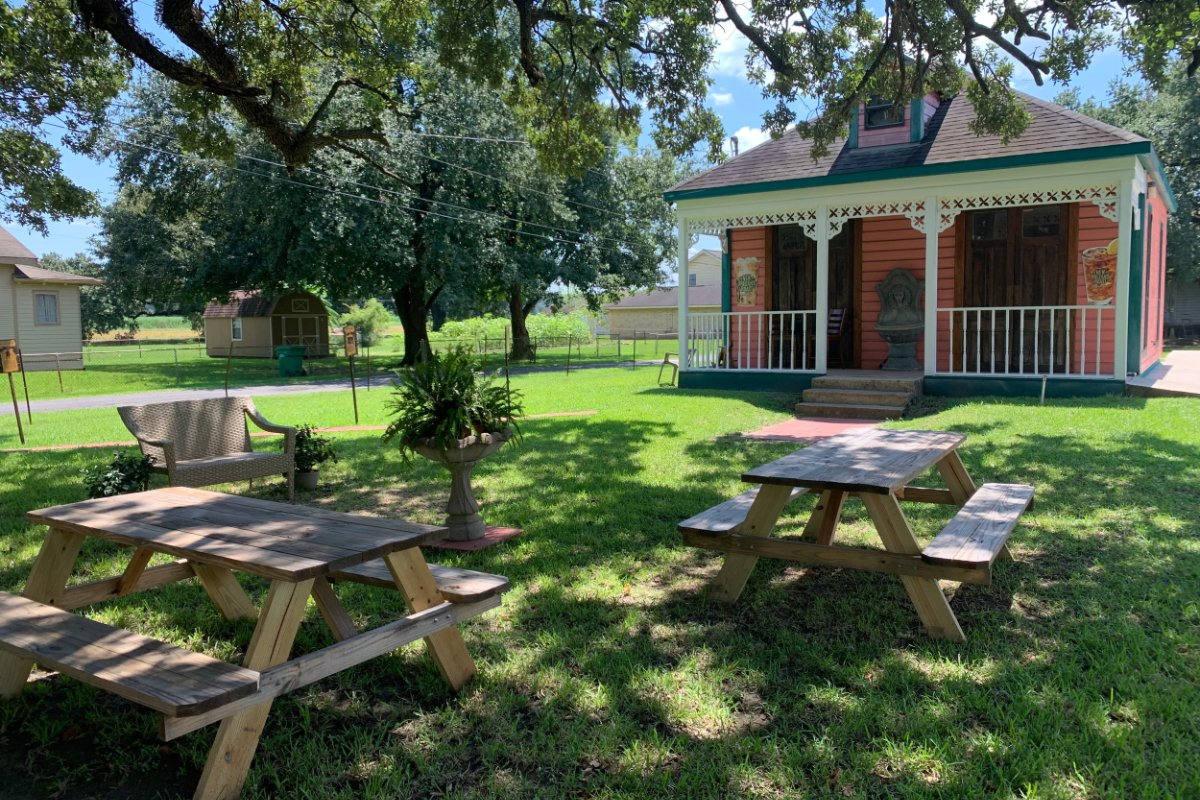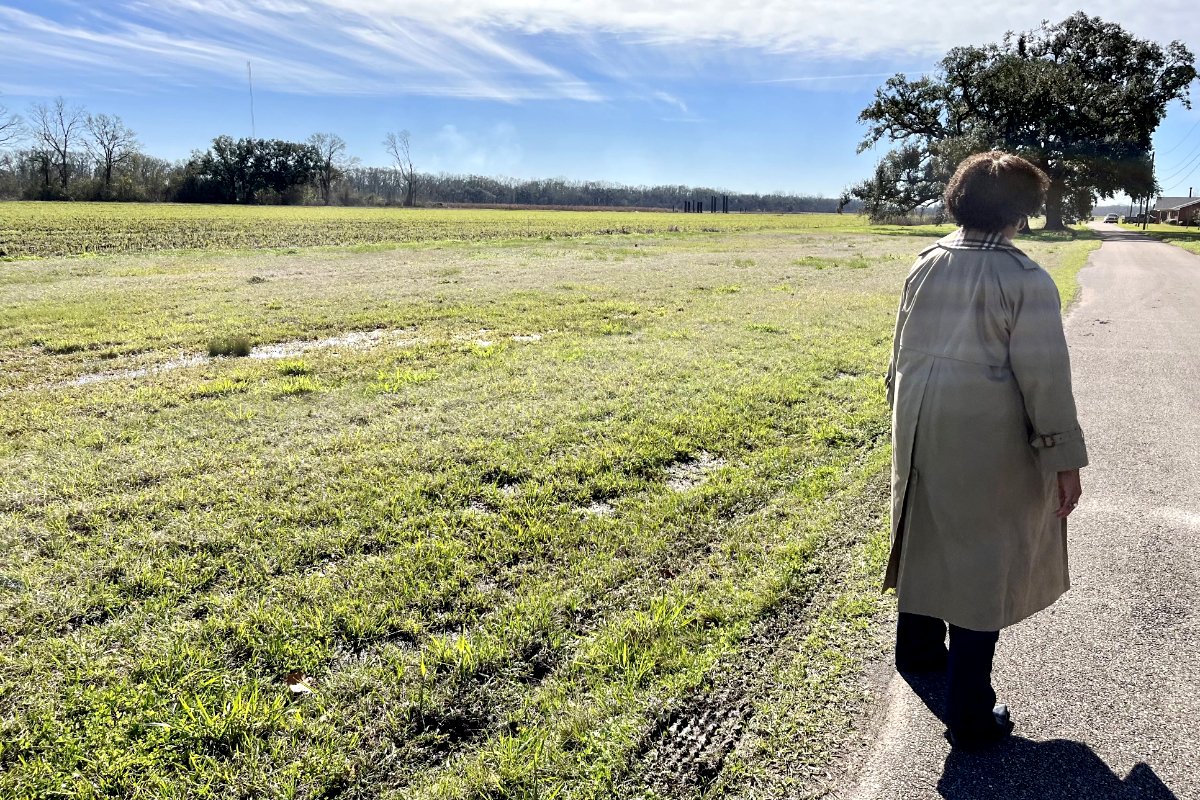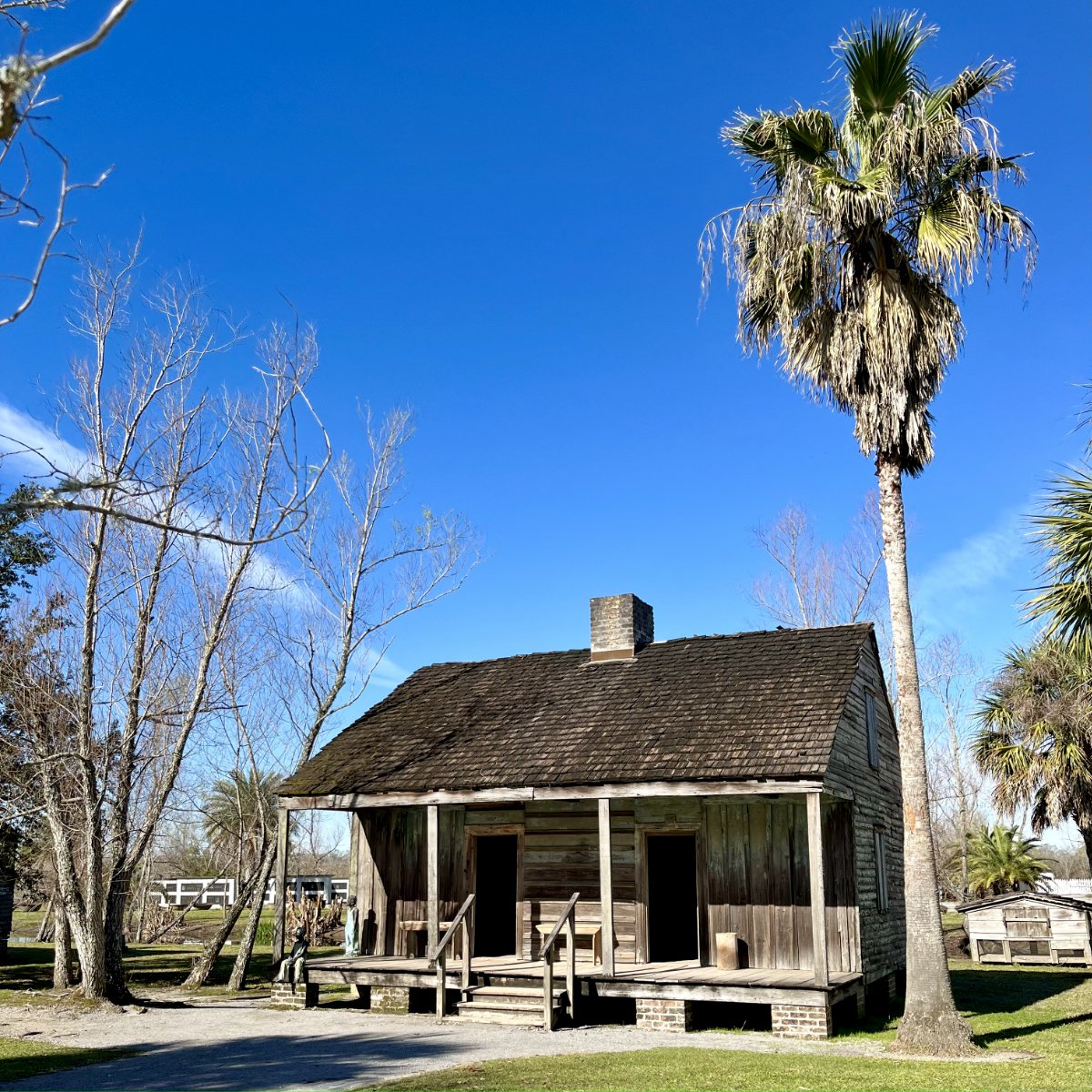Sister-run Fee-Fo-Lay Café in Wallace serves t-cakes and helps organize Black residents to fight against industrial pollution and preserve their cultural heritage.

Sister-run Fee-Fo-Lay Café in Wallace serves t-cakes and helps organize Black residents to fight against industrial pollution and preserve their cultural heritage.
March 28, 2023

August 6, 2024 update: Greenfield announced it was officially canceling its plans to build a green terminal in St. John the Baptist Parish, citing delays in permit approvals as the reason. In response, Jo and Joy Banner released a statement that read, in part, “We’ve fought for three long years to save the community, way of life, and heritage we love. Now the real work begins. We look forward to working with the community to heal, preserve, and build a healthy, bright future together.”
April 2024 update: A local council has voted to rezone the site where the Greenfield terminal is proposed, clearing the way for the development once again. The Descendants Project is now challenging that zoning change in court. Earlier in the year, Jo and Joy Banner also announced they acquired the Louisiana plantation where America’s largest slave revolt occurred to “ensure the vibrancy of a major Black historic landmark that faced an uncertain future.”
August 4, 2023 update: A Louisiana judge ruled in favor of the Descendants Project in a lawsuit that challenged the industrial zoning of the land where Greenfield planned to build its grain terminal. The site will now be returned to residential zoning, which will prevent the development of the terminal and other industrial projects.
In 2019, twin sisters Jo and Joy Banner opened Fee-Fo-Lay Café in the tiny town of Wallace, Louisiana, population 775. Using her grandmother’s recipe, Jo wanted to make and sell Louisiana cookies called t-cakes. After a stint working in local tourism, she thought a café that catered to tourists passing through would be the perfect way to build the local economy while selling tasty treats.
It turns out, however, that the café’s location in St. John the Baptist Parish comes with unique challenges. At the same time, it offers opportunities to further environmental justice.
Fee-Fo-Lay’s quaint, covered porch faces a long grassy hill that is actually the back of a levee marking the bank of the mighty Mississippi River. The mound of earth hides the smokestacks, flares, and hulking industrial structures that loom over the river in every direction. Just across the river from the café is the Atlantic Alumina factory, where buildings across the entire complex are tinted red due to bauxite ore, a potentially toxic material used in aluminum production. The Marathon Petroleum refinery is right up the river. Shell Norco’s petrochemical plant is around the next bend.
It’s a region northwest of New Orleans that many years ago was given the nickname “Cancer Alley.” For decades, residents have been pointing to the concentration of pollution from hundreds of oil refineries, chemical plants, and other factories to explain how often they and their families have received cancer diagnoses. Recently, researchers in Tulane’s Environmental Law Clinic provided new science to back up their claims. Their study confirmed that toxic air pollution in the region is in fact linked to higher rates of cancer in its residents, who are disproportionately Black.
Before industry moved in, the same stretch of river was dotted with sugarcane plantations. Now, the descendants of the enslaved people who were forced to work the fields populate towns like Wallace. Jo and Joy Banner’s descendants worked on at least two nearby plantations.

Jo Banner stands next to the field where the Greenfield grain elevator will be built. (Photo by Lisa Held)
In 2020, the sisters created the Descendants Project to protect the health, land, and lives of the Black river parish communities they were born into. Now, they’ve thrown themselves into defending Wallace from an industrial development that stands to completely transform the town. In the wide-open field next to Fee-Fo-Lay, construction pilings mark the beginning of a planned grain shipping terminal that would receive barges packed with corn and other grains from Midwest farms, store the grain, and then transfer it to ocean vessels for export.
The planned 54 silos and conveyor structure on the site would tower over the village and café and potentially add particulate matter to the air, exacerbating air pollution. (Greenfield says the facility will be built with state-of-the-art technology that minimizes airborne pollutants and that many local residents support the development based on jobs and economic development it will provide.)
Fighting the terminal project and working to preserve their community has taken so much energy, the sisters can’t keep Fee-Fo-Lay open for regular daily hours anymore. Instead, the café has become a ground zero for community action, environmental justice tours, and activism to protect their cultural heritage.
“It’s my platform,” Jo said earlier this year, while sitting underneath the sprawling live oak that frames the front yard. In the past month, they’ve hosted a handful of groups, including environmental advocates, journalists, students, and community members. On March 12, they’re hosting a musical pilgrimage event with the nearby Whitney Plantation to trace connections between the land, the river, and the area’s residents, concluding at the café.
Jo Banner is frustrated that she can’t simply spend her days making t-cakes and pralines, serving coffee and beignets, and improving the financial health of the business. But she says the choice was clear. “Do I sacrifice my community, or do I sacrifice the business? For me and Joy, we’ve got to fight for the community and fight for what’s right, fight for all the people that have been living here and would not be comfortable living anywhere else.”
Civil Eats recently spoke with Jo Banner about her family history in Wallace, telling stories beyond the plantation, and why she and her sister are fighting the planned grain elevator.
You grew up in Wallace. Why did you and your sister decide to spend your lives there and commit so strongly to the place?
First of all, we spent a lot of time with our grandparents. They were our babysitters when my parents were working. My grandparents, but especially my grandmother, had a way of sharing history. She just loved talking about her experiences and her grandparents and what life was like. So, we grew up hearing all these different elements of the culture and understanding who we were. There are a lot of different layers and a lot of different textures. They would tell us crazy folktales and strange stories or religious stories. They made it magical. And we could play with our cousins when we wanted to. We could run around in the empty fields and just really enjoy living in a supportive community. I was with someone recently talking about “immediate” family, and I honestly had no idea what it was. I said, “Your great-aunt is not your immediate family?” I could not understand that, because that’s not how we ever lived.
Where did the idea for a café come from?
I had initially wanted to start a cookie company. We have a cookie recipe that has been handed down in my family for 150 years. It’s called a ‘tit gateau cookie, or a t-cake. It’s like Louisiana in one little perfect-sized bite. It speaks of the culture, it speaks of our history. At one time, I started making them and I was getting orders for them; I started that business—but that was the year Hurricane Katrina happened. After that, it never really took off the way that I wanted it to, so I shut it down.
When I was working at the tourist commission, I started to understand all the different pieces. I wanted to have history out there that was being told from a descendant’s standpoint and to have an attraction that was descendant-owned. So that really inspired me to start the café and expand beyond the cookies. Whitney Plantation had opened and was drawing a lot more people to our side of town. And that was a good partnership. It showed you can have a plantation that’s telling the story of slavery and referring business to a descendant-owned business.

A building at the nearby Whitney Plantation that used to house enslaved people. (Photo by Lisa Held)
What role does the café and its food play in this history and the work you’re doing now?
We’ve had people who go to the plantations, which is a heavy experience, and they just need to decompress. They come out in the yard, enjoy the tree, and see a different side of life, outside the plantation. They see that we’re still here. They understand that some people were able to get off the plantations and create the communities that we have now. I had a customer and he was very quiet, and he just wanted beignets and coffee. He said, “I’m sorry. I just came from Whitney, and I’m all in my feelings. I just need to eat.” And I said, “Look, go ahead. I totally understand.” We’ve had many people who needed that time to ground themselves. And we’re actively working to build out and make space for dealing with trauma.
Why did you decide to include the Legends and Lore Trail?
What we want to do is make sure that everyone, locals but especially tourists who come here, understand what other stories we have beyond the plantations. That’s why we made that very simple little trail. We were surprised by how successful it was.
You’re fighting to stop the Greenfield terminal, but if the grain elevator is built, what will happen to Fee-Fo-Lay?
We’ll be ruined. The best part about the cafe is being outside enjoying this space. We have the trail, the yard, the tree. Whether it’s locals or tourists, who would want to sit next to a grain terminal? If it comes, my business is done for. These companies come in and say that they provide jobs and they’re going to provide economic development. Well, what about the people who are already here trying to build the economy and making it work?
It’s magical to be in a place where your ancestors really shaped the land, where you can see their influences and feel this really deep rootedness. And you know, my ancestors were into economic development. They were into investment. They were into real estate. When you’re fighting heavy industry and they’re coming in here and bragging about inviting investment, I’m thinking, “We’ve been doing this for generations.”
Some of my ancestors walked right off the plantation and then invested right back into the community and had a plan to move forward. This is not anything new for us. They laid the groundwork, and I figure we should still be here trying to foster that.
This interview was edited for length and clarity.

October 9, 2024
In this week’s Field Report, MAHA lands on Capitol Hill, climate-friendly farm funding, and more.
October 2, 2024

October 2, 2024

October 1, 2024

September 30, 2024

September 25, 2024

September 25, 2024

Like the story?
Join the conversation.